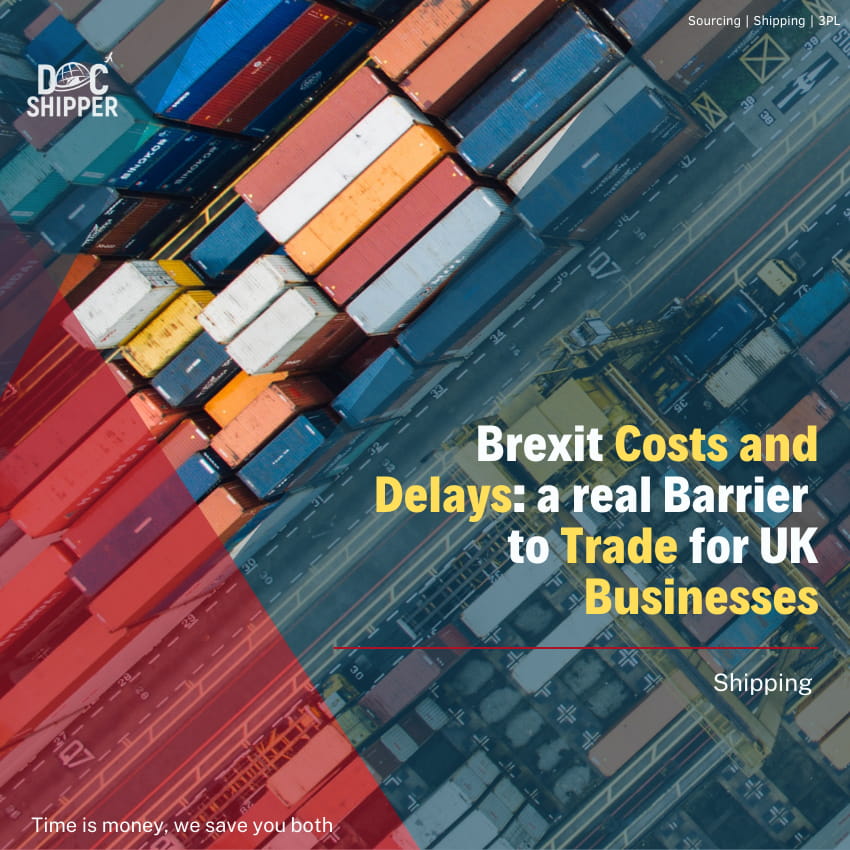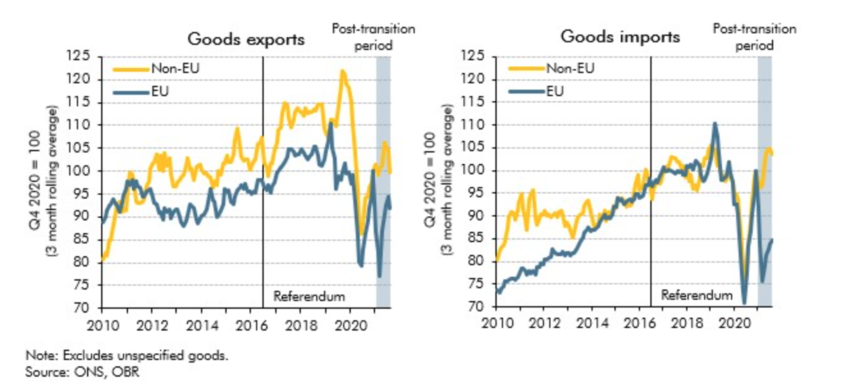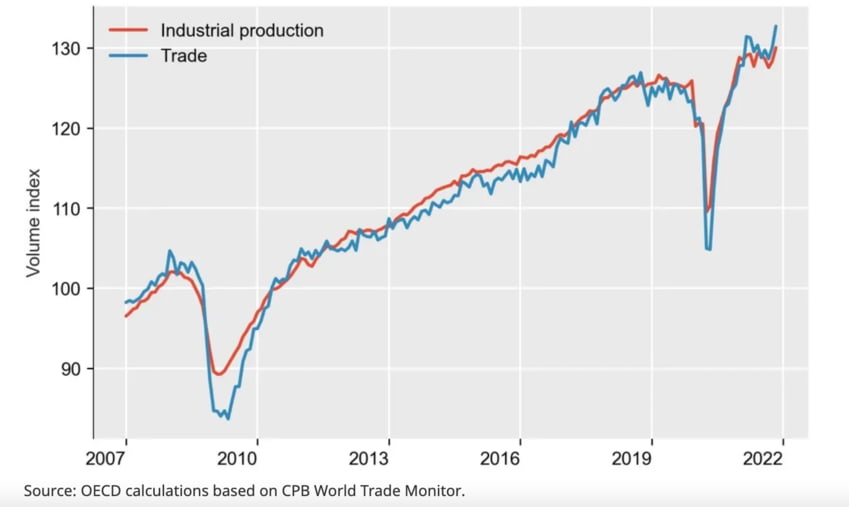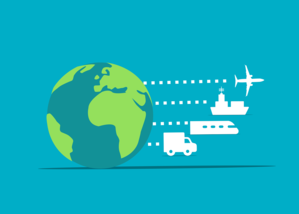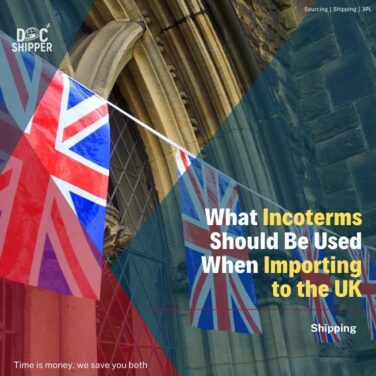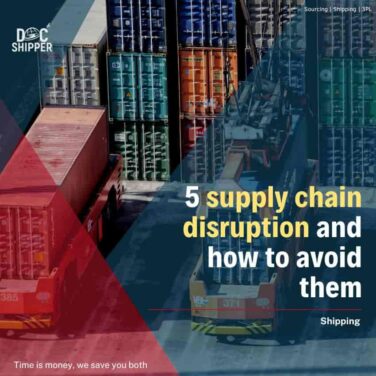Since the UK officially left the EU in 2020, the cost and delays of Brexit have put enormous pressure on British manufacturers and retailers who trade with the rest of Europe and beyond. The introduction of new trade barriers and bureaucracy has resulted in increased costs and delays in the movement of goods between the UK and the EU.
The following article aims to provide information on the impact of Brexit on trade, specifically the post-Brexit relationship between the UK and the EU. At the same time, you can choose a reliable logistics carrier to assist you in every step of your import/export business. DocShipper, as a professional logistics company, provides you with personalized services.
The UK’s Post-Brexit Relationship with the EU

New tariff and Non-tariff barriers
Trade between the UK and the EU after Brexit faces new tariff and non-tariff barriers, and these new measures will have a negative impact on trade. First, the new tariffs will increase the cost of exporting products to the EU for British companies, reducing their competitiveness in the EU market. In addition, the new non-tariff measures will also increase the costs and risks for businesses in trade, which will also expose them to more trade restrictions. These new trade barriers may also lead to the loss of original EU customers for UK companies, which will have a negative impact on the UK economy. In addition to the EU market, the UK’s trading partners include other countries and regions, but the new trade barriers may also have a negative impact on these trade relationships.
Border Control after Brexit
Border control has changed significantly after the UK’s withdrawal from the EU. After the withdrawal from the EU, the border between the UK and the EU has become more complicated, and import and export trade has faced more challenges and restrictions. In order to strengthen border control, the UK government has increased the regulation of import and export products and increased the declaration and inspection procedures, resulting in longer clearance times for import and export products, thus affecting the production and delivery plans of enterprises.
In addition, the UK government has implemented export control measures for a number of important products, such as medical supplies, food, and plant and animal products. These measures may lead to product shortages and increase operating costs, resulting in longer delivery times and uncertainty for businesses.
Impact on UK business trade
After Brexit, UK import and export companies have really suffered. In addition to facing new tariff and non-tariff barriers to trade, the UK may also face greater barriers to trade in services. For example, UK financial services companies will need to obtain permission from specific EU countries to operate within the EU. This could lead to a loss of competitive advantage for UK financial firms in the EU market.
The UK’s withdrawal from the EU may also lead to a reduction in demand for UK products in the European market, further affecting the business of UK import and export companies. Within the EU, many UK companies have supply chains in order to buy and sell products, and these supply chains are now also affected, which could lead to order delays and business disruptions. In addition, EU trade agreements will no longer apply to the UK after the UK leaves the EU, so the UK may need to renegotiate new trade agreements, which may take longer to resume trade.
DocShipper Tip
International import and export trade is becoming more and more complex due to a number of factors. This time, doing business the right way will bring you many benefits, and as a team of professionals with over 11 years of experience, our experts are ready to help you. Simply fill out the form here and one of our experts will get in touch with you.
The Impact of Brexit on UK-EU Trade
To a large extent, the post-Brexit impact on European integration will be twofold, that is, it will promote the development of European integration to a certain extent, but at the same time, it will have a considerable negative impact on the development of European integration.
Economy Affected by Brexit
The UK economy has been significantly affected by Brexit. The uncertainty surrounding the UK’s departure from the EU led to a slowdown in investment and economic growth. Since the referendum in 2016, the pound sterling has weakened significantly, leading to higher import prices and inflation. Additionally, many businesses have faced increased costs and trade barriers as a result of Brexit, which has impacted their profitability and ability to compete in the global market.
Changes in import-export trade volume
There is no doubt that Brexit has significant economic and political implications for the UK itself. Since the UK’s decision to leave the EU in the 2016 referendum, the UK economy has suffered considerable negative impacts. The UK’s trade dependence on the EU was already high, with the UK’s total exports and imports to the EU accounting for about half of its total exports and imports. 2015 saw the UK as the EU’s top trading partner until 2015, when it was overtaken by the US in second place, dropping to the EU’s third largest trading partner by 2018. EU exports to the UK have also declined following the UK’s decision to leave the EU, accounting for 15% of its total exports in 2019, lower than exports to the US (19%) and slightly higher than exports to China (9%). 19% and 12% for the US. What’s more, due to the dual impact of Brexit and the new crown epidemic, according to data released by HM Customs and Excise in January 2021, in the first 11 months of 2020, the UK’s cumulative total exports and imports of goods fell by 12.7% year-on-year, with exports down 15% and imports down 11%.
DocShipper Info
As a professional international logistics company, we offer a wide range of transportation options: sea, air, rail, or land. In addition, we also offer customs clearance services. In order to save your time and money, contact our experts and we will provide you with an exclusive solution that will save you time and effort.
Compounding effects on the supply chain
The impact of the pandemic is still being felt in many countries, which is one of several near-term challenges. These challenges include the ongoing conflict in Ukraine, elevated energy costs, and disruptions in domestic labor.
“You put all of that together, it’s the compound effect that’s impacting on supply chains,” Harrison said. “But if you ask what’s the difference — the difference is Brexit.”
Covid
According to the latest figures released by the Office for National Statistics (ONS), the total value of the UK’s international trade in goods in 2020 was £1.14 trillion, a decline of 9.8% compared to 2019. Of this, the value of UK exports was £393.7 billion, down 9.9% year-on-year, and imports were £701.7 billion, down 9.7% year-on-year.
These figures show that the new crown epidemic has had a significant impact on the UK’s import and export trade. First, the epidemic led to a global economic downturn and reduced demand, which led to a decline in both UK exports and imports. Secondly, the New Crown epidemic has also led to logistical and supply chain problems such as blockades and travel restrictions, which have also had a negative impact on UK import and export trade.
War in Ukraine
The ongoing conflict in Ukraine may have indirect effects on the UK’s import and export economy. One potential impact is on energy prices, as Ukraine is a major transit country for natural gas from Russia to Europe. Any disruption to this supply chain could lead to increased energy prices in the UK and across Europe, affecting international businesses and consumers alike.
Furthermore, the conflict could also lead to increased geopolitical tensions and uncertainty in the region, which could have ripple effects on global markets and trade. This uncertainty could lead to decreased investment and trade between the UK and other countries in the region.
Energy costs
The impact of falling energy costs on UK trade can be complex and multifaceted. On the one hand, the energy crisis can reduce the cost of production for UK businesses, making them more competitive and potentially increasing exports. On the other hand, the UK is a net exporter of energy, and falling energy prices can hurt domestic producers and reduce export revenues. Moreover, the impact of falling energy costs on trade can depend on the specific industries and products involved. For example, lower oil prices may benefit the UK’s transportation industry, but may negatively impact its oil and gas extraction sector.
Labor disruption in the UK
Labor disruptions in the UK can have a significant impact on import and export activities. When workers in key industries such as transportation, logistics, and manufacturing go on strike or experience other labor disputes, it can disrupt supply chains and cause delays in the movement of goods. This can affect the timely delivery of goods to customers, resulting in lost sales and revenue for businesses. Labor disruptions can also lead to increased costs for businesses, this can lead to higher prices for consumers, reduced profit margins for businesses, and reduced competitiveness in the global market.
The Business Development
The UK government has implemented various measures to support businesses in adjusting to the new post-Brexit trade environment, including providing financial support for customs training and IT improvements. The government has also established freeports, which are designated areas with simplified customs procedures and tax incentives to attract investment and boost trade.
DocShipper Alert
In addition to the business implications of Brexit, a minor error or poor decision in your operations could result in significant financial losses. Therefore, if you require assistance, please remember to seek advice from our team of experts who are readily available to assist you with just one click. Please feel free to contact us here
Impact of Brexit on Businesses
With the costs that come with Brexit, there are also opportunities for UK businesses to explore new markets and expand their operations. However, businesses will need to be prepared to navigate new trade barriers and regulations and adapt to the changing trade landscape.
Increase in trade costs and Delays
These barriers have resulted in longer transit times, increased transportation costs, and administrative burdens for businesses involved in trade between the UK and the EU.
For example, a UK-based manufacturer exporting goods to the EU now has to go through additional customs checks, such as providing customs declarations and certificates of origin, and comply with EU product standards and regulations. This can result in delays at the border and additional costs for the exporter, which may lead to higher prices for consumers. Similarly, an EU-based company exporting goods to the UK now faces additional administrative requirements and costs, such as obtaining a UK Economic Operator Registration and Identification (EORI) number and complying with UK customs regulations. This can also result in delays and higher costs for the exporter, which may affect their competitiveness in the UK market.
Increase in uncertainty
Brexit has created a significant increase in uncertainty, particularly in terms of trade and the economy, due to several reasons:
- – Future trade deals
- – Regulatory changes
- – Economic impact
Decrease in market share
After the UK leaves the EU, it may be difficult for companies to predict future tariffs and taxes and to determine reasonable trade costs. In addition, Brexit may result in certain UK companies losing their original supply chains and sales networks within the EU, further reducing their market share in the European market.
Measures taken by the company
In the event of Brexit, companies will need to adopt new strategies to adapt to change and ensure business or international business sustainability.
Research for new markets
As trade between the UK and the EU faces new tariff and non-tariff barriers, some companies need to find new markets to compensate for trade losses. For example, some manufacturers in the UK are looking to establish new trade relationships with companies in places like the US and Asia.
Adjustment of the supply chain
As Brexit may lead to longer delivery times and increased uncertainty, some companies may consider adjusting their supply chains. For example, companies may choose to establish closer relationships with suppliers within the EU to reduce obstacles.
The development of British import and export trade
After Brexit, the development of British import and export trade has been impacted by a number of factors, including changes in regulations, trade agreements, and customs procedures. As a result, some businesses have faced challenges in maintaining their supply chains, and there has been a shift towards sourcing goods domestically or from countries outside the EU. However, the full impact of Brexit on UK trade is still evolving, and its effects may take some time to fully materialize.
DocShipper Tip
At DocShipper, our team of shipping professionals stands apart from other service providers in the industry due to our extensive experience and knowledge, along with our 24/7 availability to meet your needs. We stay up-to-date with real-time global trade developments, allowing us to provide tailored solutions that best suit your requirements. Get in touch with us, and we will respond promptly to your inquiry.
Enhancing Trade with Non-EU Countries
After Brexit, the UK has the opportunity to pursue trade with non-EU countries without being constrained by EU trade policies. The UK is likely to explore strengthening its trade relationships with countries such as the US, Canada, Australia, and New Zealand, and to increase both imports and exports. This will enable the UK to expand its global reach and diversify its trading partners beyond the EU, which could have long-term benefits for the UK economy.
Expanding Digital Trade for UK Businesses
After Brexit, the UK government will promote the development of digital trade and digital economy, and promote the innovation and application of digital technology and digital services. Digital trade is closely related to import and export, and the emergence of digital technology has made import and export easier and more efficient. The rapid growth of digital trade has facilitated the growth of international trade, changing the shape of trade and making cross-border trade more convenient and efficient. Digital technology allows goods and services to be traded across borders via the Internet and also facilitates economic cooperation and trade flows between countries. The UK hopes that it can expand its international market share through digital trade.
Promoting Free Trade Agreements
After the UK leaves the EU, the UK government will actively promote free trade agreements with other countries or regions to replace the EU free trade agreements lost after the UK leaves the EU. This will create more trade opportunities for the UK, improve the UK’s international competitiveness, and boost the UK’s economic growth. For example, the UK has signed free trade agreements with countries such as Japan, Canada, and Australia.
Seeking a trade agreement with the EU
Despite the UK’s withdrawal from the EU, the trade relationship between the UK and the EU remains very close. The UK government will continue to seek trade agreements with the EU to ensure that trade relations between the two sides can continue to run smoothly. In addition, the UK may also strengthen trade relations with the EU by reaching agreements with organizations such as the European Free Trade Association (EFTA) or the European Economic Area (EEA).
Conclusion
In summary, the cost and delays of Brexit have put enormous pressure on British manufacturers and retailers who trade with the rest of Europe and beyond. Trade between the UK and the EU after Brexit faces new tariff and non-tariff barriers, and these new measures will have a negative impact on trade. The UK economy has been significantly affected by Brexit, leading to a slowdown in investment and economic growth, increased costs and trade barriers as a result of Brexit, and impacted profitability and ability to compete in the global market. Under all these pressures, in order to actively promote import and export trade, the UK needs to find effective ways to make up for the backwardness. If you need to import or export goods in the UK, don’t hesitate to contact us and take advantage of our high-quality shipping services.
FAQ | Brexit Costs and Delays: a real Barrier to Trade for UK Businesses
Read more
Looking for more? These articles might interest you:
DocShipper info: Do you like our article today? For your business interest, you may like the following useful articles :
- What Are The Features Of Freight Forwarding Software?
- Exploring Business Opportunities with Chat GPT: applied to the Supply Chain Management
- What is the documentation you need in the export shipping process?
- How to invent a product that sells? What beginners need to know?
- How to defeat your most difficult E-commerce cashflow challenge ?
Need Help with Logistics
or Sourcing ?
First, we secure the right products from the right suppliers at the right price by managing the sourcing process from start to finish. Then, we simplify your shipping experience - from pickup to final delivery - ensuring any product, anywhere, is delivered at highly competitive prices.


Fill the Form
Prefer email? Send us your inquiry, and we’ll get back to you as soon as possible.
Contact us

